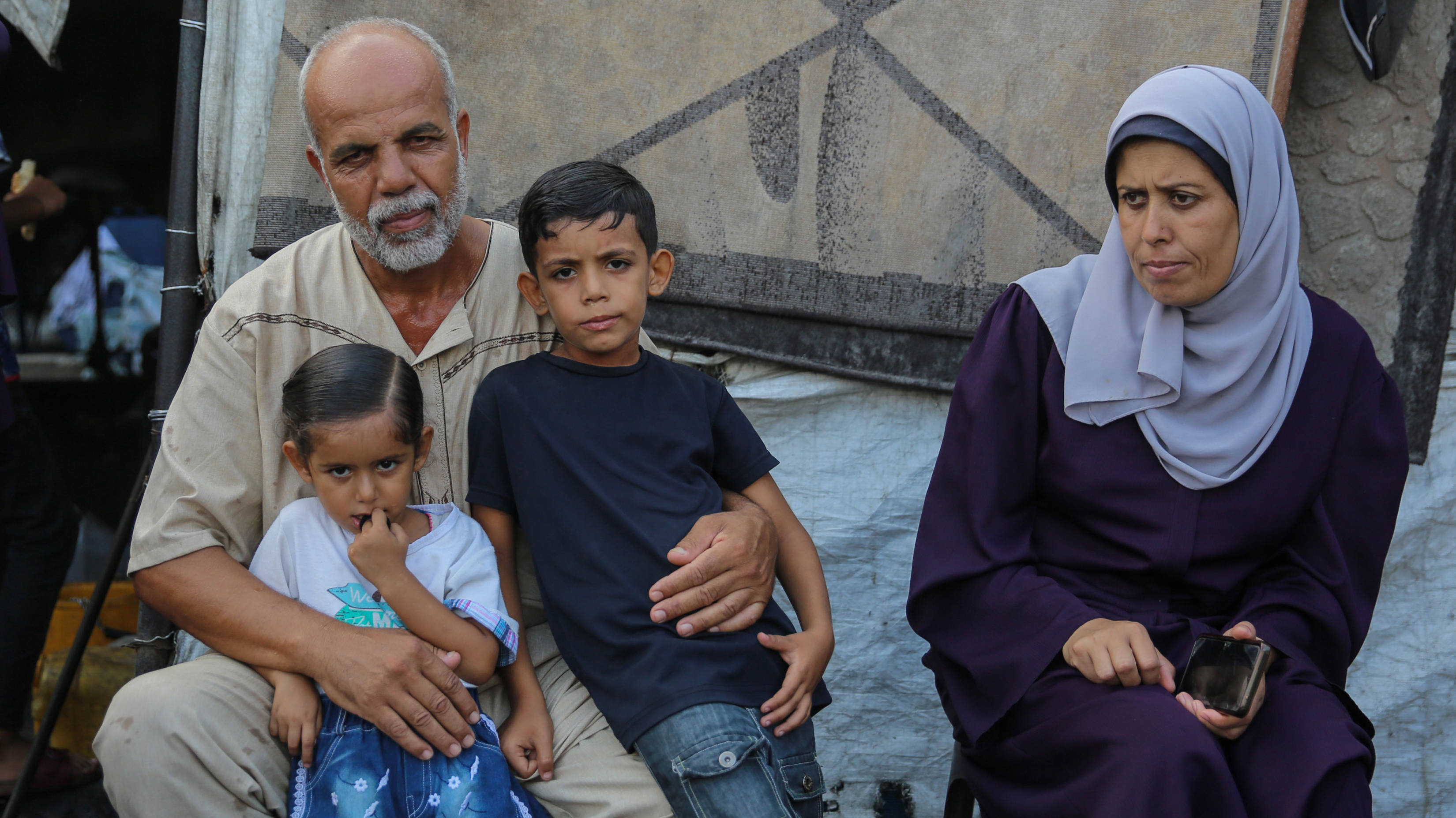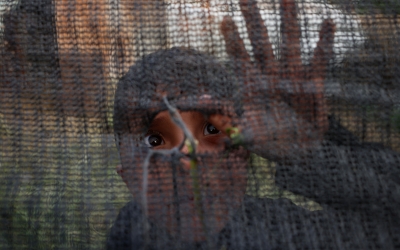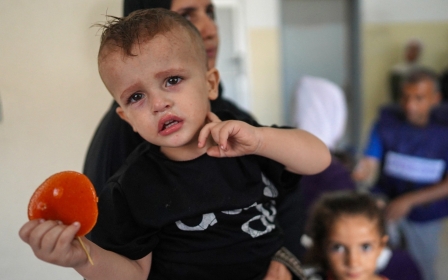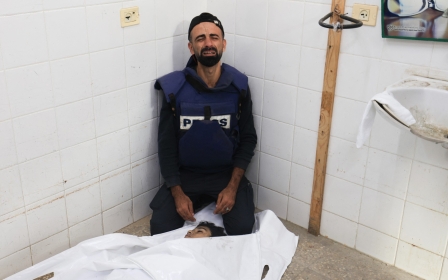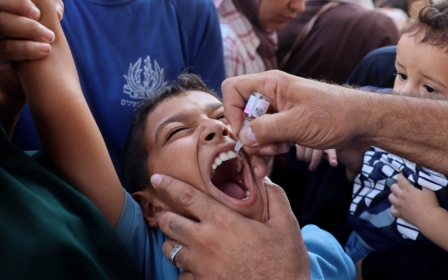‘Stuck in sixth grade’: Gaza's children begin new school year with no class
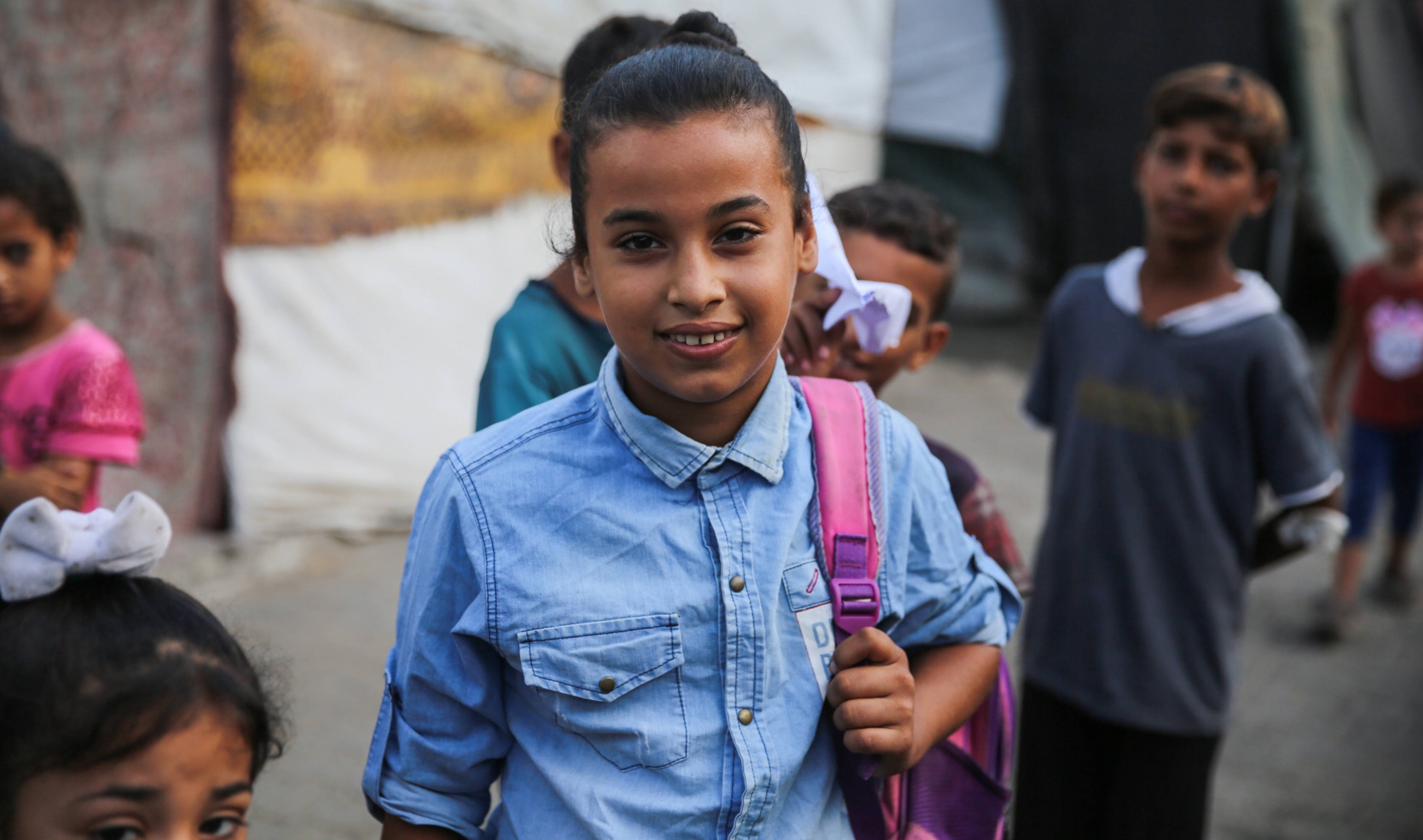
Afnan Khaled al-Shenbari bought a pink backpack for the new school year in late August 2023, excited to begin her final year of primary school.
Less than two months into the term, in the early hours of mid-October, she took her books out of the bag, filled it with a few pieces of clothing, and fled her home with her family under intense Israeli bombardment of the Gaza Strip.
For the second consecutive year, Shenbari and students across Gaza are losing yet another academic year due to the ongoing Israeli war in the enclave.
‘Stuck in sixth grade’
Currently displaced in a Deir al-Balah school in central Gaza, the girl, originally a resident of Beit Hanoun in the northern Gaza Strip, told Middle East Eye that her dream is to use her school bag for its intended purpose.
New MEE newsletter: Jerusalem Dispatch
Sign up to get the latest insights and analysis on Israel-Palestine, alongside Turkey Unpacked and other MEE newsletters
“I’ve been stuck in the sixth grade for two years now, because I’ve never had the chance to finish it,” 12-year-old Shenbari said.
“In the fifth grade, I had a high average by the end of the year, 92 percent, but I was hoping to get an even higher one in the sixth grade. But here I am, spending my life in school, not for education, but as a shelter from the shelling.”
Less than a week after Israel declared war on the blockaded Gaza Strip, the Israeli military issued mass evacuation orders, designating Gaza City and the northern parts of the strip as “dangerous combat zones” and instructing residents to relocate to the central and southern areas.
'Here I am, spending my life in school, not for education, but as a shelter from the shelling'
- Afnan al-Shenbari, 12
A few weeks later, the Israeli military completely severed the northern parts of Gaza from the central and southern parts, forcing hundreds of thousands of displaced Palestinians - who have been unable to return to their homes for approximately eleven months - to remain in schools.
“When we were displaced from our home, we sometimes walked and sometimes rode in cars, with the shelling in front of us, until we reached this school,” Shenbari said.
Out of Gaza's 2.2 million population, approximately 700,000 children and young people were enrolled in schools and universities in 2023.
As part of its educational response in Gaza, Unrwa, the UN Palestinian refugee agency, launched on 1 August the Back to Learning programme.
The first phase included psychosocial support activities, focusing on arts, music and sports, and raising awareness of the risks posed by explosive ordnance. In the current second phase, the focus has shifted to informal learning activities, which include lessons in reading, writing and maths.
“Over the past months, we couldn’t study anything, but now I have Arabic, English, and maths lessons - one hour per lesson a week,” Shenbari said.
“Science is my favourite subject, but we don’t take that now. I hope to become a medical lab analyst in the future and thus I need to learn science.”
‘Terrifying’ journey to school
Displaced in the same school is seven-year-old Ibrahim al-Mubayed, along with his parents, sister and grandparents.
Before the war began, he had just started school for the first time, walking there each day on what he described as an “enjoyable” journey.
When he fled his home to an Unrwa school in November, he says the journey was “terrifying.”
“Before the school year started, my mum bought me a backpack that lights up when I pat it. It was blue, but I didn't take it with me when we were displaced; I left it at home, and now the house has been bombed,” he told MEE.
“I used to walk to school on foot; my school wasn’t far, and I enjoyed the walk every day. When we came to this school as displaced people, I walked halfway, and the other half my grandfather carried me because I fainted from exhaustion and fear.
“The road wasn’t nice; it was far, very far, and I saw a tank on the way. I tried to look straight ahead and not look at the tank so that the [soldiers] wouldn’t see me.”
Mubayed and his family walked approximately 11 kilometres from the Shujaiya neighbourhood in eastern Gaza City to the Nuseirat refugee camp in central Gaza. However, they were displaced several more times afterwards until they reached the school in Deir al-Balah.
Mubayed says that he now sleeps and takes shelter from the bombardment on the second floor of the school, in a classroom similar to the one where he was supposed to be receiving his education.
“In my school back in Gaza [City], I used to sit in class to write and learn. I would play football with my friends [in the schoolyard], but this school isn’t nice. It’s full of tents, and we cannot play here,” he said.
'My heart aches for all children'
In a post on X, formerly Twitter, Unrwa Commissioner-General Philippe Lazzarini said: “Boys and girls around the region are going back to UNRWA schools except in Gaza. More than 600,000 children there are deeply traumatised, living in the rubble. They continue to be deprived of learning + schooling. Half of them used to be in UNRWA schools.”
Lazzarini added that more than 70 percent of the schools across the Gaza Strip are either completely destroyed or damaged due to Israeli attacks.
'My youngest son was supposed to start school this year, but just like other children, he is busy with his siblings fetching water and searching for food'
- Ahmed al-Hammami
Unrwa estimates that, as of 30 August, at least 563 displaced people sheltering in its facilities have been killed and over 1,790 wounded since 7 October.
Ahmed al-Hammami, a father of two schoolchildren and two university-aged young women, believes that Israel is “deliberately trying to keep Palestinians uneducated.”
“Today, the school season has started in the West Bank and around the world, but all we in Gaza can think about is, ‘The missile might hit us [any moment] now,’” said the 43-year-old, originally a resident of the Shati refugee camp, west of Gaza City.
“The occupation is doing this intentionally, they target children by all means. And if you look at the number of martyrs, you will find that the majority are children and women.”
More than 40,860 Palestinians have been killed and around 94,400 have been wounded in Israeli attacks since 7 October.
“My youngest son was supposed to start school this year, but just like other children, he is busy with his siblings fetching water and searching for food,” he said.
Hammami said that the lack of education is deeply affecting children’s behaviour in Gaza, making them aggressive and violent.
“My heart aches for all the children who cannot go to school for the second year in a row, for my children, who used to be top students in their schools; today, for the second year in a row.”
Middle East Eye delivers independent and unrivalled coverage and analysis of the Middle East, North Africa and beyond. To learn more about republishing this content and the associated fees, please fill out this form. More about MEE can be found here.


